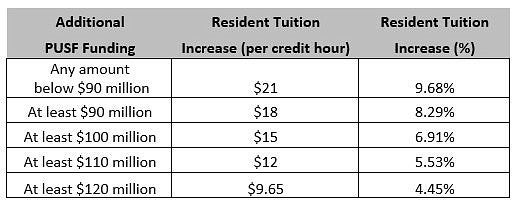May 20, 2019
To University of Oregon community members,
Over the last week, I have received in-person and online input from students and other campus stakeholders on the 2019–20 resident undergraduate tuition recommendation from the Tuition and Fee Advisory Board (TFAB). I greatly appreciated hearing from students at the open forum, and I want to thank everyone who invested the time to share their point of view. I have considered all of your advice and suggestions, which helped influence my thinking on this matter. My recommendation to the Board of Trustees is slightly modified from that presented by TFAB.
Resident tuition rates closely correlate to the level of support provided by the state of Oregon. However, we may not have certainty about where state support will net out until late June or early July. Therefore, I am asking the Board to consider a proposal that would index the UO’s tuition rate for resident undergraduates to potential state funding levels. Unfortunately, that means proposing tuition levels that exceed 5 percent, something I had hoped we would not have to do. Any tuition increase over 5 percent must be approved by the state’s Higher Education Coordinating Commission.
In the last few days, we have seen a positive state revenue forecast and heard optimistic rumblings from lawmakers regarding the prospects for a boost to statewide higher education funding. For that reason, I am eliminating any recommendation for a tuition rate increase over 10 percent. As I and many others have repeated for months, the University of Oregon has joined with all of the public universities in the state in making the case that a minimum of a $120 million increase in funding for higher education is needed to broadly maintain our current level of service for students and to keep this year’s tuition increase at or below 5 percent. I also departed from TFAB’s recommendation by adjusting the lowest possible tuition rate down to 4.45 percent, which is dependent on receiving the full additional $120 million in the state’s Public University Support Fund (PUSF). My recommended tuition schedule is:

Of course, there is risk built in my decision to recommend a top rate of 9.68 percent. As TFAB recognized in its recommendation, it is possible that the state will allocate less than $80 million to the PUSF, which means that we would encounter a greater shortfall in funding in 2019-20 than planned. I believe that this is a risk worth taking because I and the trustees find a tuition increase over 10 percent to be too burdensome for our students. However, if the legislature fails to allocate $80 million to the PUSF this year, we will need to increase our tuition next year to incorporate this shortfall, even if that would cause tuition rate increases to exceed 5 percent again.
Regardless of where the tuition rate settles out, I am worried about the impact on our institution’s most vulnerable students. The UO currently allocates about $44 million annually to fee remissions, including support for the PathwayOregon program, which provides full tuition and fees to academically qualified, Pell Grant-eligible residents who start as first-year students on our campus. In fact, almost one-in-four of our in-state residents receive the PathwayOregon benefit already, and they will be protected from the impact of rising tuition regardless of the percent increase. If the tuition rate increase exceeds 5 percent, however, I will set aside up to $350,000 in new dollars for grants for low-income students who are not supported by Pathway.
Even with the proposed resident undergraduate tuition increase, the UO will still face considerable budget challenges. For this reason, we need to move forward with our plans to reduce general fund budgets and expenditures by $11.6 million. We are doing everything possible to ensure that the reductions in our schools and colleges have as little negative impact as possible on academic activities and programs including career faculty and staff members, as well as critical student support services.
Due to a perfect storm of uncertainty around state funding and other budget challenges, this has been an incredibly difficult year in terms of setting tuition. I hate that we must consider tuition rate increases above 5 percent and I will continue to work until the end of the legislative session to make the case that lawmakers need to provide a level of support that would not unduly burden resident students. Our economy is seeing unprecedented growth, and our state’s students and families deserve better.
Despite the budget constraints, I remain optimistic and dedicated to preserving and advancing the progress we have made over the last few years. We are continuing to enhance excellence in teaching, research, and support for student access and success programs. As I have said previously, even though we are in a challenging period, the hurdles we face are not insurmountable. Even in the face of adversity, we must remain vigilant in our pursuit of excellence in all that we do at the UO.
Thank you.
Michael H. Schill
President and Professor of Law
